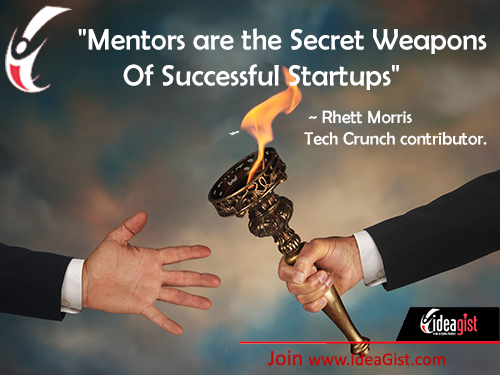Mentors are sometimes compared to beacons; in fact, Webster's Revised Unabridged Dictionary defines the word “beacon” as, “That which gives notice of danger,” and “To give light to, as a beacon; to light up; to illumine.” Mentors do for startup founders and entrepreneurs what beacons did for centuries (before GPS, satellites, radio, live weather mapping and global communications took over), guiding ships through violent storms, past treacherous obstacles like reefs, rocks, shoals, pirates, and other hazards, and providing a point of reference to mariners to help them evaluate or judge a situation.
Mentors haven't achieved their standing without having traveled their own entrepreneurial journey, with plenty of setbacks and failures under their belts before achieving success. What sets them apart from those don't succeed is an ability to learn from failure without giving up on their idea. They've identified a problem that needs solving, and setbacks are just part of the journey. And therein lies the value of a mentor; they can draw on years of experience and storehouses of insight (and hindsight) to equip the next generation of business and technology leaders with a point of reference for evaluating setbacks, which can be a daily part of life for entrepreneurs.Those who achieve success learn from them and carry on.
IdeaGist's global blockchain platform creates new demand for mentors
IdeaGist, the world's largest online incubator, is a huge advocate of startup-mentor collaborations and supports a strong and diverse network of exceptional professionals who make themselves available to business startups and entrepreneurs utilizing the IdeaGist platform. IdeaGist recently launched its global blockchain Incubator platform, designed to help innovators with disruptive solutions to real-world problems using blockchain technology. The blockchain platform prompted enthusiasm for industry professionals to mentor platform users who are in the early stages of developing their ideas.
But for all the proven advantages mentors provide to startups, many inexperienced founders opt to follow their own instincts and take a pass on mentoring opportunities. Statistically, going it alone without a mentor could prove to be a regrettable mistake.
Some eye-opening stats on the value mentors bring to startups:
• 70% of mentored businesses survive five years, twice the survival rate of non-mentored businesses, according to a study by UPS. The same study found that 88% of businesses said that having a mentor is invaluable.
• Additionally, startups are seven times more likely to raise investment money and three-and-a-half times more likely to grow user numbers for their products and services if they have helpful mentors. Startups are seven times more likely to raise investment money and three-and-a-half times more likely to grow user numbers for their products and services if they have helpful mentors.
Mentors who achieved success as entrepreneurs and startup founders are unique in that they have the ability to spot problems that need solutions, the innovative intellect to generate credible ideas, and the perseverance to work on the idea until their intended goal is achieved. Most experienced failures, setbacks, and disappointments along the way. What sets them apart from startup founders and entrepreneurs whose businesses don't survive the journey is the unwavering conviction that they will achieve their goal. Rather than surrendering to obstacles and influences that upends their progress, they pivot. Sometimes they're forced to pivot time and again, but they accept each setback as a new lesson learned rather than a defeat, and begin looking for new perspectives on the original idea.
A mentor can offer a valuable opportunity to understand the perceptions and strategies necessary for a startup to succeed. A mentor can mean the difference between learning when and how to pivot and survive on the harrowing path that most entrepreneurs encounter, and being relegated to an epitaph in the graveyard of startup casualties.
Global tech giants and their legendary mentors
Some of today's most successful tech giants were founded by mentored entrepreneurs: Facebook's Mark Zuckerberg was mentored by Apple founder Steve Jobs. Jobs was mentored by entrepreneur and angel investor Mike Markkula who became the second CEO of Apple Computer, Inc. American businessman and software engineer Eric Schmidt, executive chairman of Google from 2015-2017 and ranked as the 119th richest person in the world by Forbes, mentored Larry Page and Sergey Brin of Google. As of May 2017, Forbes estimated Page's worth at $44.8 billion, and Brin holds assets valued at $43.7 billion.
IdeaGist's Expert Session mentor program
IdeaGist is currently accepting blockchain technology startup founders and entrepreneurs and has taken action on positive feedback from the blockchain community in support of making experts available to mentor members who wish to take advantage of the opportunity to enlist a mentor of their choosing. Earlier this month, IdeaGist introduced the paid expert session program that allows seasoned technology experts, serial entrepreneurs, and veteran startup advisors to offer their time to mentor incubator members. Members can pay for one-hour mentor coaching sessions and earn IdeaGist rewards in the process.
The mentors will be able to charge for their time in U.S. currency, IdeaGist tokens, or a combination of the two. which can be applied to incubator platform services. IdeaGist will charge a flat platform fee for the service, ensuring complete transparency to both the buyer and seller. The goal is to provide startup founders and entrepreneurs a chance to discover the value a mentor can offer their venture, and foster an environment of helping others in the development phase while receiving help when needed.
Learn how you can bring your blockchain technology idea to the new incubator platform, and leverage the advantages of the large network of experienced and enthusiastic mentors. Click here to start.
Mentors: game changers for startup success

